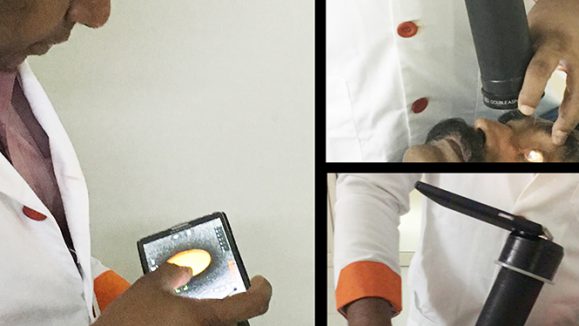As artificial intelligence (AI) spearheads its way through multiple industries, it’s no surprise that healthcare is becoming one of the largest to utilize newer technology. And, with the rise of machine learning capabilities, it’s only a matter of time until the field of ophthalmology catches on – or, maybe it has already.
Dr. Michael Abramoff, MD, PhD, is a distinguished, award-winning ophthalmologist, computer scientist and founder of IDx. He has spent years pioneering AI technology for diagnostic use in diabetic retinopathy (DR). And now, after decades of development, IDx-DR, a fully autonomous diagnostic system, has been cleared by the US Food and Drug Administration (FDA) as of 2018.
IDx-DR and how it works
“The diagnostic AI system uses advanced imaging to detect hemorrhages, microaneurysms, new vessels and exudates indicative of diabetic retinopathy,” explained Dr. Abramoff. “But it’s more than just an algorithm; it’s a precise imaging system that provides an immediate diagnosis – within 30 seconds.”
With its feature-recognition-based system, the IDx-DR analyzes images from the Topcon NW400 camera (Tokyo, Japan) to report a positive or negative result. Based on biomarker imaging, the system will yield a result represented as “more than mild diabetic retinopathy” or “negative for mild diabetic retinopathy”. From this information, the participant can then be referred to a specialist or retested in 12 months.
Current diagnostic practices
China, India, and the United States are the top three countries with the highest prevalence of diabetes according to the International Diabetes Federation (IDF). While DR may be slow to develop, it is still largely undiagnosed. “Diabetic retinopathy affects millions of people worldwide as the leading cause of vision impairment and blindness,” said Dr. Abramoff. “Therefore, it is critical to accurately screen for DR for further evaluation by an eye care provider.”
Even with the growing need for DR diagnosis, current practices may not be efficient or accurate enough. Many physicians’ processes differ in how they might diagnose an imaging panel. Some studies on screening with wide-angle retinal cameras and imaging interpretation techniques have shown a mere 33% sensitivity. By utilizing treatment-based reference standards, AI technology can produce more accurate results with greater sensitivity.
The origin of ‘The Retinator’
Dr. Abramoff’s journey in developing IDx-DR started almost 21 years ago. After discovering a need for more efficient diagnostic processes for diabetic retinopathy, Dr. Abramoff decided to focus on perfecting assessment tools for early DR diagnosis. Dr. Abramoff joined the University of Iowa (UI-COMM) Faculty in 2004 and dedicated years to pinpointing algorithms to identify and diagnose diabetic retinopathy. He later founded his AI company, IDx in 2010.
Developing IDx-DR was not without obstacles. In fact, when Dr. Abramoff presented his AI proposal to the FDA it was initially returned. As with most experts who go against the grain, Dr. Abramoff had trouble garnering a supportive response. While few people were on board with AI technology in 2010, others were starting to see the true potential of autonomous systems. He was given the name “The Retinator” by the Ophthalmology Times for his AI work in ophthalmology.
Despite setbacks, Dr. Abramoff continued optimizing his algorithms. For instance, one major obstacle of other diagnostic systems included bias from other variables such as age or ethnicity, (i.e. varying retinal tone and color could disrupt an accurate diagnosis). “Bias was always a concern,” explained Dr. Abramoff. “You don’t want an AI system that’s very accurate for one group or race but not for another – you need to deal with it in the design phase. For this reason, we built the IDx-DR to be age or racially invariant. Because subgroups may look different, the system identifies diagnostic lesions and hemorrhages to protect against bias.”
Pivotal trial of an autonomous AI-based diagnostic system
In recent years, the FDA has criticized AI technology for its lack of uniform certification in quality and safety. Intensive peer-reviewed studies have since been published, determining the capabilities of AI to amass trust and support for its use. One such study was the clinical trial that tipped the FDA’s decision in favor of approval.
In the trial, 900 subjects with diabetes underwent diagnostic testing in primary clinics across the US. The trial used a patient outcome-based reference standard to diagnose patients. Results showed that the autonomous AI-based system exceeded all pre-specified superiority endpoints of sensitivity, specificity and diagnosability to achieve acceptable safety, efficacy and equity.
“Clinical trials need to be focused on these three endpoints across different populations,” said Dr. Abramoff. “The AI system needs to be generalizable to ensure proper evaluation of the clinical outcome.”
It can be easy to disregard new technologies without sufficient clinical support. But the evidence for the IDx-DR is clear. With refined protocol and training processes, IDx-DR has a proven 96% diagnosability in de novo primary care offices.
After testing more than 25 camera types and delivering thousands of exams from minimally trained operators, Dr. Abramoff’s system has been maximized with assistive AI and advanced imaging analysis. Its ease of use has also proved to be a plus for those specialists looking to enhance current workflows. Specialists can often take weeks or months to finalize a diagnosis. But, with the IDx-DR capabilities, true diagnoses are revealed within minutes.
Interestingly enough, the operators of the AI system can be trained in only four hours. In other words, it can even be operated by someone with a high school education. “There was a question of whether we can get a number of high quality images in the primary care setting by someone who is not experienced in diagnostic imaging,” said Dr. Abramoff. “So now with the IDx-DR, it improves workflow with little operator involvement.” This feature also allows for greater accessibility and utilization in lesser developed communities who are in the greatest need of medical care. Especially where a specialist visit can be costly, the system can be quite economical while ultimately decreasing the incidence of blindness.
Will machines take over?
One concern that many physicians share is how AI and technology will affect the career landscape. Many physicians who go through years of schooling might not be pleased to find out that a robot can do their job faster while providing accurate results.
While systems like IDx-DR are meant to be fully autonomous, they can also complement the practice of ophthalmology. By utilizing AI technology, physicians can focus more on treatment rather than diagnosis while spending more time on developing crucial relationships with the patient to address any concerns.
Because IDx-DR has gone through extensive validation, testing and clinical analysis, it has become a reliable tool in the physician arsenal and the community as a whole.
Future developments for AI systems
Dedicated to promoting the benefits of AI based diagnostics, IDx may develop diagnostic algorithms for other parts of the eye. By helping to increase the rate of diagnosis, AI systems can help drive more patients to treatment. When carried out properly, it’s a win-win for both the patient and the physician.
Since 2018, the AI system has now been able to produce quick point-of-care results for thousands of patients. Even without a present retinal specialist, the system can provide specialist quality diagnostics in primary care settings. No human review or oversight is needed.
Dr. Abramoff and his company are continuing to forge partnerships to increase awareness and accessibility to IDx-DR. Not only is it gaining momentum, but it is also paving the way for favorable public perceptions of AI technology. While the company has plans to distribute it globally, IDx-DR is now being implemented in numerous clinics throughout the US.




